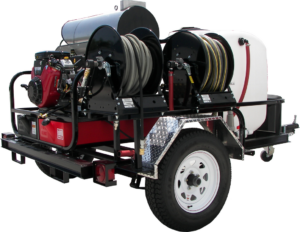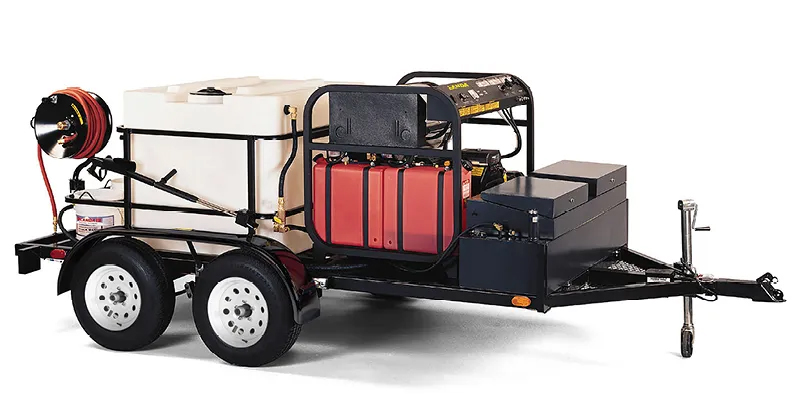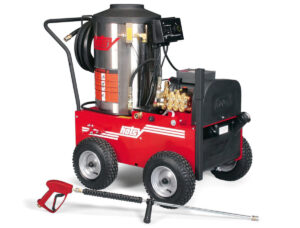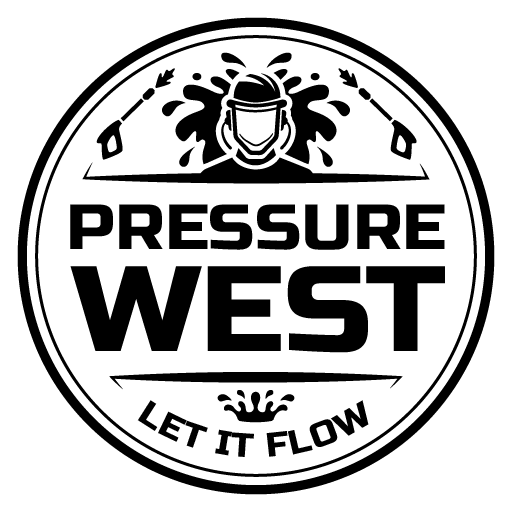When it comes to choosing the right equipment for heavy-duty cleaning, power washers are at the top of the list. But not all power washers are created equal, and one of the biggest decisions you’ll face is whether to go with a gas or diesel power washer. Each type comes with its own set of benefits, limitations, and best-use scenarios. Understanding the differences can help you make an informed decision that aligns with your needs, whether you’re cleaning construction equipment, commercial buildings, or large-scale outdoor areas. You can explore our full line of Pressure Washing Trailers to see which configuration fits your operation best.
(Want a fully mobile cleaning setup? Check out our guide on Hot Water Pressure Washer Trailer Advantages to explore your options!)
Understanding Gas Power Washers
Gas-powered pressure washers are widely popular for residential and light to medium commercial use. They’re generally more affordable than diesel models and offer a good balance of power and portability. Most gas power washers run on unleaded gasoline and are equipped with smaller engines, making them easier to transport and operate.
Gas models are great for:

- Homeowners tackling large outdoor cleaning jobs
- Contractors who need mobile equipment
- Situations where lighter cleaning tasks are frequent
Gas pressure washers are also easy to find at most hardware stores, and replacement parts or repairs are typically inexpensive. Many models are also designed with user-friendly features such as electric start and adjustable pressure settings, which can enhance usability for non-professionals.
However, gas power washers tend to be less efficient for extended industrial use. They have shorter engine lifespans compared to diesel models and may require more frequent maintenance if used under intense conditions. Gas engines are also less efficient under continuous load and can generate more emissions, which may be a consideration for environmentally conscious users.
Diesel Power Washer: Built for Heavy-Duty Use
A diesel power washer is designed for rigorous, long-term industrial cleaning. These machines are built with powerful engines that can withstand extended use without overheating or wearing out quickly. Typically used by professionals in construction, agriculture, and heavy industry, diesel power washers offer exceptional performance and reliability.
Advantages of a diesel power washer include:
- Greater fuel efficiency during long operating periods
- Enhanced durability and engine longevity
- Ideal for remote job sites where diesel is more readily available than gasoline
Diesel engines are known for producing more torque, which can result in higher water pressure output. This makes them suitable for demanding applications like removing caked-on mud, grease, or paint from hard surfaces. In addition, diesel engines are generally built to stricter industrial standards, meaning they often come equipped with more rugged components that handle rough conditions better than their gas counterparts.
Diesel models are commonly used in sectors like mining, construction, agriculture, and marine operations. They’re often paired with hot water systems, making them ideal for degreasing and sanitation tasks where heat is essential.
(Looking for something with built-in mobility? Read about Industrial Pressure Washer Trailer Requirements to find the right system for your needs!)

Comparing Maintenance Needs
Maintenance is an important factor when comparing gas and diesel power washers. Gas-powered washers usually require more frequent tune-ups, including spark plug replacements, oil changes, and air filter cleaning. They’re more sensitive to fuel quality and may experience performance issues if left idle for long periods.
Diesel power washers, in contrast, are built for extended use and typically have longer maintenance intervals. While repairs and parts for diesel units can be more expensive, the machines themselves are more reliable under continuous use and less likely to fail unexpectedly.
In general:
- Gas power washers are easier and cheaper to service but may need it more often
- Diesel power washers have longer-lasting components, which can justify the higher service costs over time
If you’re operating in remote areas or on a tight schedule, the reliability of a diesel unit may outweigh the higher cost of occasional servicing.
Diesel Power Washer vs Gas: Cost Considerations
When comparing costs, gas power washers are usually less expensive upfront. This makes them a common choice for homeowners or small businesses that don’t need industrial-level performance. Diesel power washers, on the other hand, have a higher initial price tag but offer better value over time for businesses with heavy-duty cleaning needs.
You should factor in:
- Purchase price
- Fuel cost and availability
- Expected lifespan and maintenance expenses
- Frequency and intensity of use
While gas may be more readily available at most service stations, diesel is often more economical for extended use, particularly in commercial or agricultural operations. Also, businesses that already operate diesel-powered vehicles or equipment may find it more convenient and cost-effective to standardize their fuel use.
Which One Should You Choose?
Choosing between a gas and diesel power washer depends on how and where you plan to use it. If you need a lightweight, portable washer for occasional use, a gas model will likely meet your needs. But if your work demands high power, continuous operation, and rugged durability, investing in a diesel power washer makes more sense.

For example, a contractor who frequently cleans heavy equipment in remote areas may benefit more from a diesel-powered unit, while a landscaper maintaining suburban properties might find a gas-powered washer more practical. If you’re running a mobile pressure washing business or servicing large industrial equipment, the strength and reliability of a diesel unit can help you complete tasks faster and with less downtime.
Another consideration is resale value. Diesel power washers often retain their value longer due to their durability and industrial-grade performance, which can be an advantage if you plan to upgrade equipment in the future.
Final Thoughts on the Diesel Power Washer vs Gas Debate
Both types of machines have their place, and the best choice comes down to your specific use case. A diesel power washer excels in demanding industrial settings, offering unmatched strength and durability. Meanwhile, gas power washers provide flexibility and ease of use for lighter or intermittent jobs.
Understanding your cleaning demands, frequency of use, and budget will help determine which power washer is right for you. With the right choice, you’ll maximize efficiency and get the most out of your investment.
Whether you’re purchasing your first machine or upgrading an existing unit, consider how often you’ll use it, what types of surfaces you’ll clean, and the importance of reliability in your work environment. With a clear picture of your needs, the decision between gas and diesel becomes much easier—and your cleaning jobs much more effective.
Looking for reliable, custom pressure washing equipment that shows up on time and gets the job done right?

